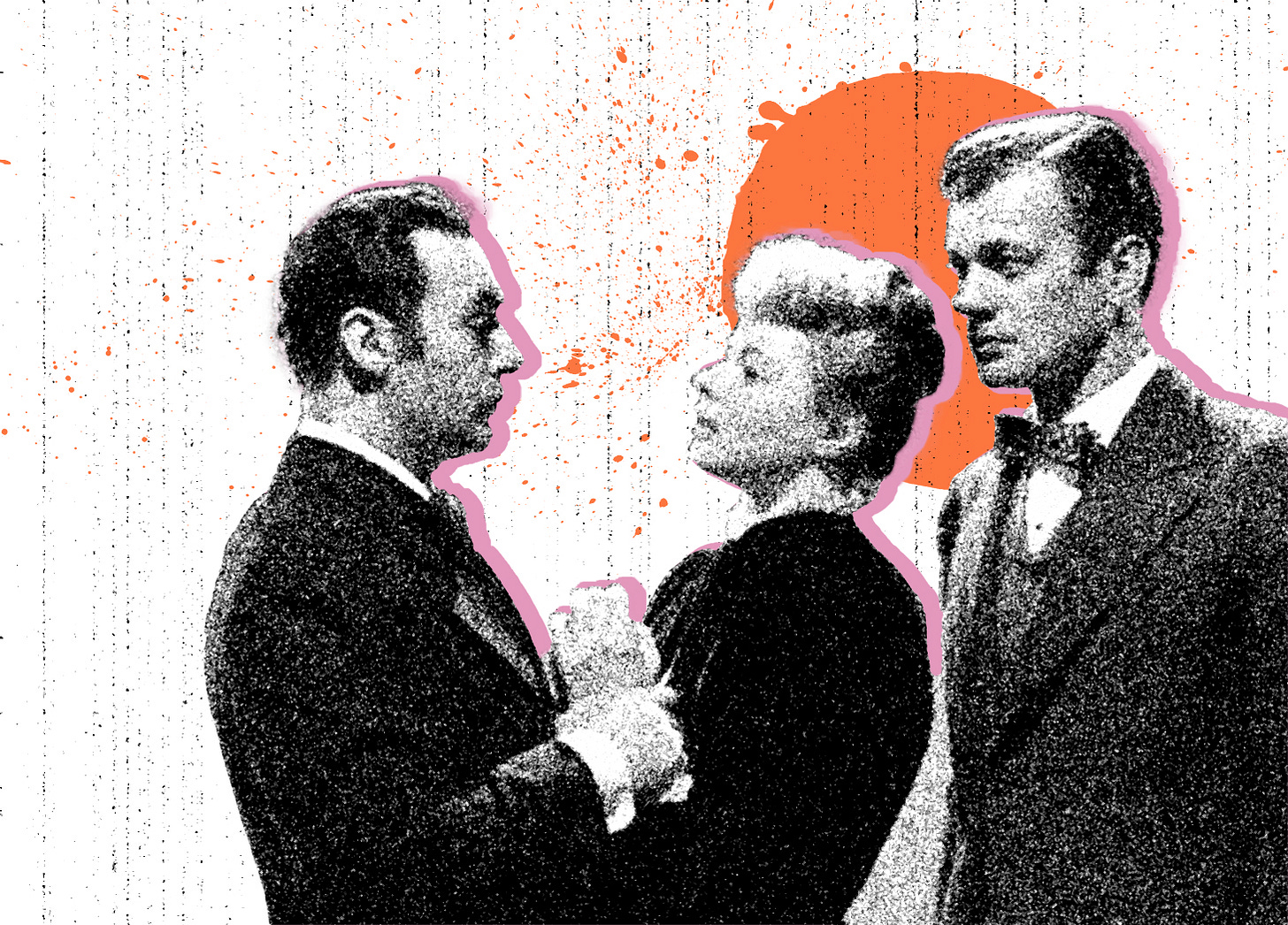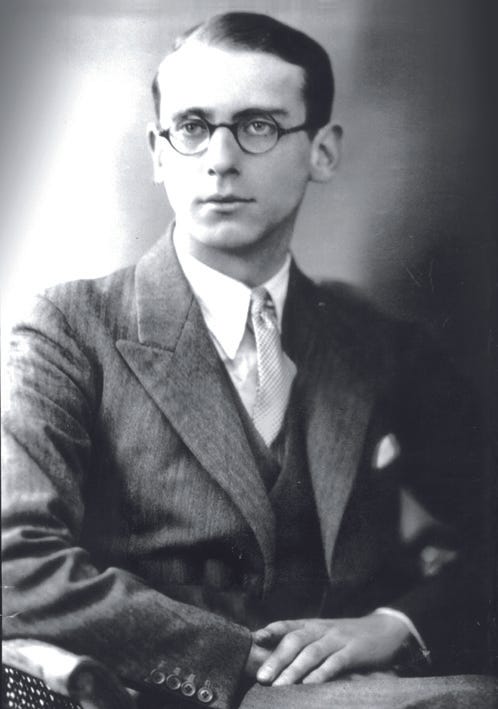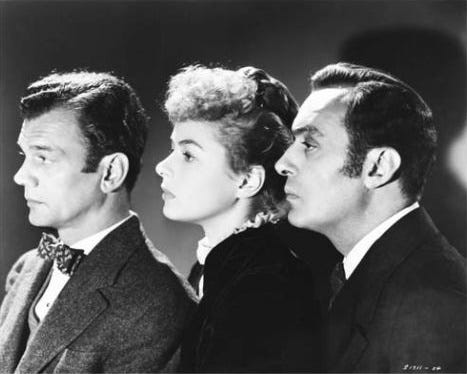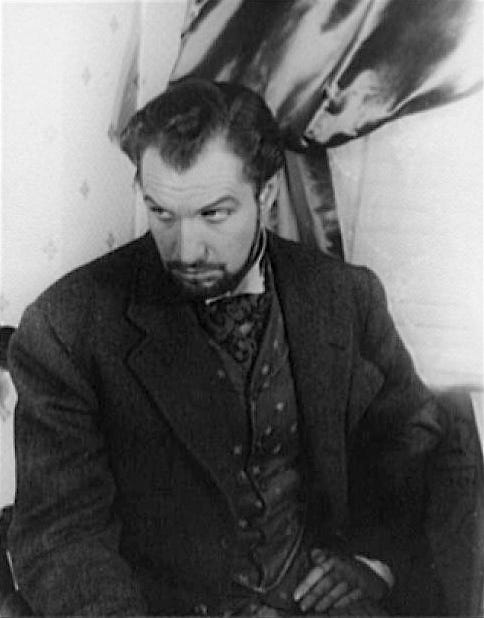GASLIGHT-ing: An Inquiry
Gideon Haigh on the origins of a ubiquitous expression

Done any gaslighting lately? Or been gaslit maybe? Sure you have. It’s the new thing, an expression whose time has come. The Merriam-Webster Dictionary, which recently anointed it word of the year, defines ‘gaslighting’ as ‘to psychologically manipulate (someone) usually over time so that the victim experiences doubts about their own emotional or mental stability’ or ‘to badly mislead or deceive (someone) especially for one's own advantage.’ Claimed New Yorker last month: ’These days, it seems as if everyone’s talking about gaslighting.’
Such ubiquity, of course, is probably inevitable in an age where anyone a bit sad believes they are suffering ‘clinical depression’ and everyone who has ever suffered a shock ‘literally has PTSD’. These days you can even gaslight whole countries, as both Donald Trump and Joe Biden are said to have done to Americans. Other mass gaslighters range from China to Fox News; victims include the elderly, Africans and Jews. Meghan Markle and Buckingham Palace are now said to have been involved in tit-for-tat gaslighting.
Part of the expression’s charm is, as the many useful explainers explain, a seemingly unambiguous origin story and traceable continuity. The play Gaslight continues packing them in to this day, most recently in a production now touring Australia; updated by Canadian playwrights Johnna Wright and Patty Jamieson as a feminist cri de coeur about coercive control, another modish pathology. Just for kicks, and because Gaslight’s author Patrick Hamilton is one of my favourite novelists, I thought I’d take what is now called a ‘deep dive’ into the original play and two screen adaptations to see how they compare.
*
Hamilton is a candidate for the title of the best novelist you’ve never heard of. Start with his semi-autobiographical trilogy Twenty Thousand Streets Under the Sky (1935), then proceed via Hangover Square (1941) to The Slaves of Solitude (1947), and it will feel like you are marooned in the middle of 1930s London, full of pubs, tea houses and boarding houses populated by the sad, the mad, the lonely and the desperate. His play Rope was adapted for the screen by Alfred Hitchcock in 1948, and his later Gorse trilogy for television in 1987 with Nigel Havers as the eponymous seaside conman; there was a film version of Twenty Thousand Streets in 1963 and a television series in 2005. But there’s no doubt his oeuvre is patchy. A fervent Marxist, he also dabbled in fictional agitprop: simultaneously with writing Gas Light, he was dashing off Impromptu in Moribundum (1939), a heavy-handed political satire, and contributing to Time & Tide, also a publisher of George Orwell.
Hamilton shared his creative instincts, and his ideology, with older brother Bruce, a less successful novelist and more successful man, who became a respected educationalist in Barbados. I’ve also discussed Bruce’s work here. Their parents Bernard and Ellen had also earlier been writers, or at least wannabes: their efforts at romantic fiction failed to keep them, and the household was quarrelsome, emotionally chill and rigidly class-conscious.
The autobiographical resonances in Gas Light are not far to seek. Bernard, a bully, philanderer and drunkard, might well have inspired the play’s main character Jack Manningham, ‘suave and authoritative, with a touch of mystery and bitterness’; the timing of the opening scene, in ‘the rather terrifying darkness of the late afternoon - the zero hour, as it were, before the feeble dawn of gas light and tea’, must owe more than a little to the atmosphere of the family home in Brighton, for Hamilton in childhood developed a lifelong fear of the dark: ‘A night-light was given me. But this made matters worse. For the night-light, in its saucer on the mantelpiece - dim, wavering and sinking - was even more suggestive and anticipative of evil than darkness itself.’
Above all, Gas Light’s sensitivity to the menace of mysterious noises off assuredly echoes the atmosphere when Bernard returned from one of his benders:
What happened then, as overheard with dreadful intentness from the schoolroom, varied considerably. Sometimes there would be a long and inexplicable silence: the sound of his footsteps giving no clue to his actual movements or intentions…but all the curious variations were certain to end with his slamming open the dining-room (he had the gift of slamming doors open) and greeting my mother.
What then happened in the dining-room…could not be ascertained from the schoolroom. Only an incessant mumbling sound could be heard from the other side of the thick wall - mumbling, mumbling, mumbling, mumbling, going on and on and on - and on and on.
To listened to this was somehow even more terrifying than the earlier anticipation of his entrance, and the eavesdropping and its variations.
In the same way is Jack Manningham’s wife Bella transfixed by disturbances in the attic: ‘It’s when I’m all alone at night. I get the idea that - somebody’s walking about up there….Up there….At night, when my husband’s out…I hear noises, from my bedroom, but I’m too afraid to go up.’ These prove to be her husband, who is not out at all, but overhead, in search of the jewels which twenty years earlier caused him to murder the house’s previous owner but which he was never able to find.
Hamilton went on to his own life of alcoholic dissipation and emotional misadventure, which is well chronicled by Wikipedia, and recently even inspired a one-man show. But a further point worth noting is that Hamilton as a writer was drawn first to poetry then to fiction via theatre. His older sister Lalla became an actress; she married an actor, Vane Sutton Vane, for whose company Patrick first worked as a stage manager; Patrick then fell in with Andrew Melville, scion of a great theatrical family whose speciality was melodrama, which dominated British popular culture in the century between Waterloo and the Somme - the world of dark villains, incorruptible heroes, innocent heroines and comic relief. For all the shadow and murk of the Manningham home, there are no shades of grey in Gas Light; however contemporary its themes, its setting, plot and resolution are perfectly Victorian; the ending is happy, with virtue triumphant, the villain vanquished, the heroine vindicated, and the numerous improbabilities of the story forgotten. Maybe that’s another reason it’s playing so well in these morally didactic times.
*
By the mid-1930s, both Hamiltons were embarked on literary careers. Both had written a handful of novels, although Bruce’s aspirations were more conventionally attuned to popular crime while Patrick had enjoyed the signal success of Rope (1927). In writing Gas Light, however, Patrick was inspired by a throwaway line in Bruce’s debut novel, To Be Hanged(1930), where a character observes a characteristic of Victorian gas mantles.
She thought she was mighty smart, slipping away quietly when I was washing up in the scullery. But I always knew when she’d gone, because the gas in the kitchen went up brighter when she turned it out in the sitting-room. And she didn’t go up to bed, neither, unless she dressed in the dark, because it would have gone down again when she turned the light on upstairs….
Turn up the gas in one room, in other words, and it turned down the gas in others: thus the motif in Gas Light, where Jack Manningham’s sinister absences manifest in Bella’s experience as the guttering gas flame where she is sitting. Manningham is not doing this deliberately - rather is it an outcome of him turning on the light in the attic to abet his jewel searching. Sometimes it is misremembered that the gas is central to the psychological campaign Manningham is waging against his wife, such as in this droll 2017 essay in Chronicle of Higher Education by Ben Yagoda: ‘The Boyer character tries to drive the Bergman character (his wife) crazy, notably by insisting that the gaslights in their house did not flicker, when in fact they did.’ In fact, it is a device that signifies the husband’s comings and goings, and actually portends the solution. Having observed the coincidence involved in her husband’s disappearances and light’s dimming, Bella confides in kindly Inspector Rough of Scotland Yard.
Every night, after he goes out, I find myself waiting for something. Then all at once I look around the room and see that the light is slowly going down. At first I tried not to notice it, but after a time it began to get on my nerves. I would go all over the house to see if anyone had put on an extra light but they never had. It’s always at the same time - about ten minutes after he goes out…I sit here for hours terrified, waiting for him to come back, and I always know when he’s coming, always. Suddenly the light goes up again and ten minutes afterwards I hear his key in the lock downstairs and he’s come back again.
‘You know, Mrs Manningham, you should have been a policeman,’ says Rough, who enables her to see that the gas below and the noises above are causally connected.
The strength of Gas Light lies not in this rather conventional mystery; rather is it in Manningham’s subtle sleights of hand, his moving and hiding of jewellery and artworks, to convince his wife that she is losing her reason. As she explains:
He gives me things to look after, and when he asks for them they are gone, and can never be found. Then he misses his rings, or his studs, or his razors, and I will hunt the place for them, and he will find them lying at the bottom of my work-box….Only today that picture had been taken from the wall and hidden. Who could have done it but myself? I try to remember. I break my heart trying to remember. But I can’t.
On his wife Manningham is also adept at heaping petty humiliations, and in this he has a shrewd and willing co-conspirator, the maid Nancy. Nancy is in some ways Gas Light’s most intriguing character. She does not fully apprehend Manningham’s purposes, but falls in with their drift: she is less a mere tool than a calculating and menacing presence in her own right; her confidence is like the gas mantle, glowing as her mistress’s flickers. The hidden injuries of class, then, cut both ways: it is Jack embarrassing Bella in front of the servants that causes her the gravest discomfiture. ‘It’s strange that you can’t see how you hurt me,’ Bella says after he has done so the first time. ‘Can’t you see that I’m desperate? If you can’t you must have a heart of stone.’ It transpires, of course, that he can and he does.
Rough, a rhyming update of Sergeant Cuff in Wilkie Collins’s canonical mystery The Moonstone(1868), introduces the waft of decency, and of sanity. It transpires that five weeks earlier he had seen Bella on the street with a man he recognised as Sydney Power, the ‘distant cousin’ of a woman called Alice Barlow, a wealthy spinster known for her philanthropy as ‘The Cabman’s Friend’ who had met her end at the hands of a jewel thief twenty years earlier. Except that Power, he learned, was now under the alias….Jack Manningham. ‘You know, Mrs Manningham, of the old theory that the criminal always returns to the scene of the crime,’ he explains.
You are not going out of your mind, Mrs Manningham. You are slowly, methodically, systematically being driven out of your mind. And why, because you are married to a criminal maniac who is afraid you are beginning to know too much - a criminal maniac who steals back to his own house at night, still searching for something he could not find twenty years ago. Those are the facts, wild and incredible as they may seem. His name is no more Manningham than mine is. He is Sydney Power and he murdered Alice Barlow in this house. He changed his name, and he has waited all these years until he found it safe to acquire this house in a legal way. He then acquired the empty house next door. Every night for the last few weeks he has entered that house form the back, climbed up on its roof and entered this house by the skylight. I know this because he has seen me do it. You have watched the gas light, you have been aware of the same thing. He is up there now.
Bella’s initial response to this revelation is disbelief: ‘I must cling to the man I married.’ Rough has another revelation: they’re not married, because Sydney Power is already married to somebody else - a woman in Australia, where Power lived for five years. He is, what’s more, a philanderer: ‘He has a taste in unemployed actresses which he is at no pains to conceal.’ Suddenly, the scales fall. ‘Will you look me in the eyes again and see if you think I am telling you the truth?’ asks Rough. Bella replies: ‘Yes, I have known it. How strange that is…I have known it all along.’
The denouement is payback time. Power, subdued by Rough, is tied to a chair; Bella asks for a moment’s privacy with him; Power tries to exert his power over her, and help him escape; Bella responds with a speech almost delirious with triumph, flourishing the items he had secreted from her, growing in volume with her euphoria.
Here is a bill. Here is a letter. Here is a watch. See? Take them. I have found them at last you see! But they don’t help you, do they? And I am trying to help you, aren’t I? To help you to escape. But how can a mad woman help her husband to escape? What a pity. If I were not mad I could have helped you - if I were not mad I could have pitied you whatever you had done. But because I am mad I have hated you. Because I am mad I have betrayed you, and because I am mad I am rejoicing in my heart - without a shred of pity - without a shred of regret - watching you go with glory in my heart! Inspector! Inspector! Come and take this man away!
Hamilton’s female characters are always vivid, whether despairing, or domineering, or doomed. But Bella’s righteous catharsis makes Julia Gillard’s misogyny speech sound tepid and non-committal. Rough concludes that she has undergone ‘horrible’ experiences; Bella concurs before adding, with ‘a sort of proud defiance’, that they have also been ‘the most wonderful.’
*
The curtain first went up on Gas Light at the Richmond Theatre, Richmond, on 5 December 1938, with Manningham played by Dennis Arundell, his wife by Gwen Ffrangcon-Davies. It graduated rapidly to the Apollo Theatre in the West End, whereupon the film rights were acquired by Anglo-American Film Corp. Their 1940 screen version opens with the strangulation of Alice Barlow by disembodied hands, which commence a frantic and fruitless search for the jewels; next we see a prim and proper couple, Paul and Bella Mallen, leaving a church service, where they are spied by a passing B. G. Rough, now a retired policeman who remembers the man as Alice’s suspicious foreign nephew Louis Bauer.
Thorold Dickinson, a last-minute choice as director, skilfully conveys the sinister inference of the dimming light, but Anton Wallbrook, with a cod German accent, and Diana Wynyard, wan and glassy-eyed even in her concluding monologue, never really convince as the couple. Hamilton receives a screenplay credit, and the script sticks reasonably close to the original, with the addition of a few scenes, including one where the couple visit a recital, only for Paul to engineer a confrontation by secreting his watch in Bella’s bag then accusing her of stealing it. There follows a silent cab ride home, where Bella is reduced to pleading: ‘Hit me, hurt me, do anything but for Pete's sake, speak to me.’ Rather less successful is Paul’s assignation with Nancy at the Cadbury Music Hall where the song plays: ‘The boy I love is up in the gallery, / The boy I love is looking down at me…’
The film screened in the US as Angel Street,which then bequeathed that name to a Broadway production featuring the young Vincent Price, at the outset of his storied career in horror, in the role of Manningham. His baleful and malevolent portrayal garnered rave reviews: the production eventually ran 1295 performances and in turn aroused Hollywood’s interest. The American film rights had already been acquired by Columbia; they were now bought by MGM, who further reworked the British script. Bella Manningham now became Paula Alquist, played by Ingrid Bergman; Jack Manningham became Gregory Anton aka Sergius Bauer, played by Charles Boyer; they were reimagined, improbably, as a soprano and her accompanist, although this allows Bella to essay an aria from Donizetti’s ‘Lucia Di Lammermoor’, known for the most famous of all opera’s mad scenes. The recital remains, the music hall is gone, and the house has moved from Pimlico Square to Thornton Street.
The murder victim is now Bella’s aunt Alice Alquist, also a famous singer, who once treated kindly a starstruck boy, Brian Cameron. Cameron has by now grown into a Scotland Yard detective played by Joseph Cotten, who substitutes for Rough. It’s all a little kitsch, and at stages needlessly comedic, especially the role of the local busybody (Dame May Whitty). But it is redeemed by the wonderfully moody direction of George Cukor, which makes the house almost a character in its own right. It is melodrama filmed as noir. Victorian overdecoration has never looked so oppressive and claustrophobic. The performances, meanwhile, go off. Boyer is eerily cold throughout, with baroque flourishes that recall his appearances in Algiers(1938), where he invited Hedy Lamar ‘to the Casbah’, and All This, and Heaven Too (1940), where he asked Bette Davis to stay because ‘this is a moment so full of understanding that I can't bear to see it come to an end’. Bergman, fresh from Casablanca (1942) and For Whom the Bell Tolls(1943), won her first Oscar ahead of Barbara Stanwyck in Double Indemnity(1944), going from cowering before Boyer’s eyebrows to absolutely braying her final speech. Scenes are also stolen by teenager Angela Lansbury as Nancy, as manipulative as she is pert in her first screen role. Her intuition is aroused by an exchange with the other servant Elizabeth:
Nancy: What's the matter with the mistress? She don't look ill to me. Is she?
Elizabeth: I don't know. Not as I can see. But the master keeps telling her she is.
With Anton, Nancy assumes a growingly intimate tone: ‘She seems to be getting worse, doesn't she, sir?’ Anton is annoyed: ‘You will please not refer to your mistress as “she”.’ But this Nancy has her own agenda: she senses a household vacancy opening. In the annals of domestic staff with malign intent, she is almost on par with Mrs Danvers in Rebecca(1940).
*
The critic Emmanuel Levy has cited Rebeccaand Gaslight as representative of an emergent Hollywood genre he calls ‘Don’t Trust Your Husband’, also including Notorious (1946) and Sorry, Wrong Number(1948). Gaslight was certainly subversive in the casting of Boyer, a matinee idol known for his suavity. Once it became possible to distrust the husband, he, of course, became the prime suspect in many a subsequent film. In Midnight Lace (1960), for example, Doris Day is terrorised by someone who also turns out to be her husband Rex Harrison, in a film that nods to Gaslightin its London setting and swirling fogs.
But it was many decades before Gregory’s behaviours towards Paula were pathologised. Yagoda’s essay charts how the word ‘gaslight’ flickered in 1950s and 1960s popular culture, gradually denominalising: ‘gaslight’ gradually became a verb, and ‘gaslighting’ a gerund. He identifies as the earliest academic usage a passage in Culture and Personality (1961) by the American-Canadian anthropologist Anthony F. C. Wallace:
It is also popularly believed to be possible to ‘gaslight’ a perfectly healthy person into psychosis by interpreting his own behavior to him as symptomatic of serious mental illness. While “gaslighting” itself may be a mythical crime, there is no question that any social attitude which interprets a given behavior or experience as symptomatic of a generalized incompetence is a powerful creator of shame[….]
A 1965 article in the magazine The Reporter then contained the sentence: ‘Some troubled persons having even gone so far as to charge malicious intent and premeditated “gaslighting”.’ But ‘gaslighting’ would not undergo that important rite of linguistic passage, mention in the New York Times, for another thirty years, when it was deployed by Maureen Dowd. And today, of course, it is everywhere - a tax on it in the last series of Married At First Sight would have raised substantial revenue. Plus it has entered political discourse, with CNN’s Amanda Carpenter claiming in Gaslighting America (2018) that Donald Trump is its great modern master, even if psychologist Stephen Lewandowsky argues he’s far from alone.
The secret to ‘inoculation’, we are told, is to keep calm and take control, and a twist to Hamilton’s tale is that the latest stage adaptation eliminates the sardonic Rough and his sympathetic asides (‘You underestimate your powers, Mrs Manningham’). Sisters can now do it for themselves, and Bella unmasks her husband and persecutor alone. This is actually quite in faith with Bella’s line, quoted earlier, in the original play: ‘Yes, I have known it. How strange that is…I have known it all along.’
But another question would be whether promiscuous usage is undermining the utility of a valuable term: try to convince anyone who believes they are right that they are actually mistaken and be prepared for the complaint that you are gaslighting them. Yes, just as the cry of ‘virtue signalling’ is in effect an act of virtue signalling, so the allegation of ‘gaslighting’ has become a form of gaslighting. I’m sure Hamilton would have found this delicious and made it the subject of a great play.







A wonderfully last paragraph !!
Eloquent and insightful. Manipulation of the vulnerable - large and small. And who of us isn't vulnerable at stages of our life? Relationships are controlled by those who care the least. Cultural expectations to "stick with a relationship no matter what" or early life experiences that some fear abandonment are fertile ground for gaslighting. The narcissistic, sociopathic (and gambling addicts) among us know this - consciously or unconsciously - and turn it to their advantage. Life is about learning the patterns and how not to repeat them - as victim or perpetrator.
Came for the cricket and eloquence - staying for the psychological unveiling.